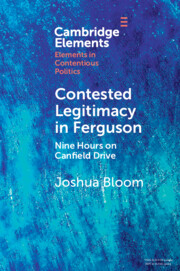8 results
Chapter 4 - The Bildung of Humanity and Modern Virtue
-
- Book:
- Herder and Enlightenment Politics
- Published online:
- 30 March 2023
- Print publication:
- 06 April 2023, pp 132-172
-
- Chapter
- Export citation
Introduction
-
- Book:
- Herder and Enlightenment Politics
- Published online:
- 30 March 2023
- Print publication:
- 06 April 2023, pp 1-30
-
- Chapter
- Export citation
9 - The Role of Race
- from Part II - The Building Blocks of Mass Incarceration
-
- Book:
- Mass Incarceration Nation
- Published online:
- 03 November 2022
- Print publication:
- 17 November 2022, pp 77-92
-
- Chapter
- Export citation

Contested Legitimacy in Ferguson
- Nine Hours on Canfield Drive
-
- Published online:
- 18 February 2022
- Print publication:
- 17 March 2022
-
- Element
- Export citation
6 - Wealth and Corruption: Eighteenth-Century Social and Economic Thought in Four Scandals
-
-
- Book:
- The Cambridge Companion to Eighteenth-Century Thought
- Published online:
- 15 June 2021
- Print publication:
- 20 May 2021, pp 182-204
-
- Chapter
- Export citation
12 - Sociality and Socialisation
-
-
- Book:
- The Cambridge Companion to the Scottish Enlightenment
- Published online:
- 04 October 2019
- Print publication:
- 26 September 2019, pp 234-247
-
- Chapter
- Export citation
13 - Historiography
-
-
- Book:
- The Cambridge Companion to the Scottish Enlightenment
- Published online:
- 04 October 2019
- Print publication:
- 26 September 2019, pp 248-270
-
- Chapter
- Export citation
8 - The Political Theory of the Scottish Enlightenment
-
-
- Book:
- The Cambridge Companion to the Scottish Enlightenment
- Published online:
- 04 October 2019
- Print publication:
- 26 September 2019, pp 151-176
-
- Chapter
- Export citation

